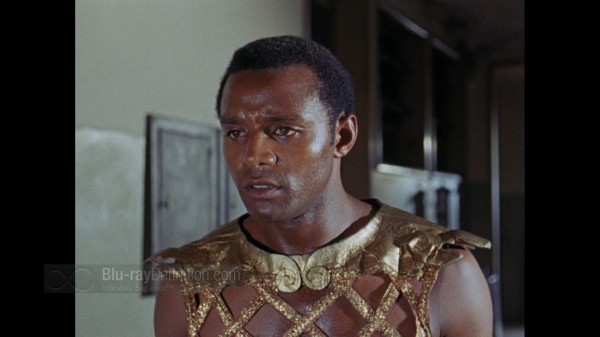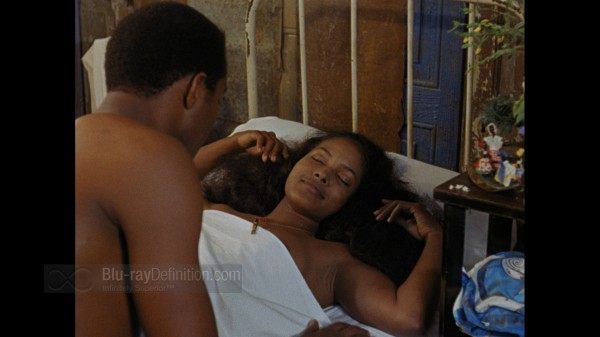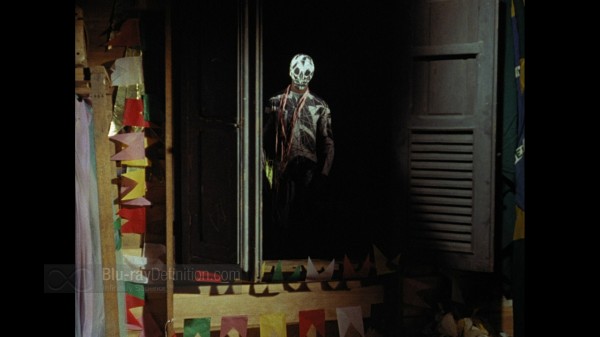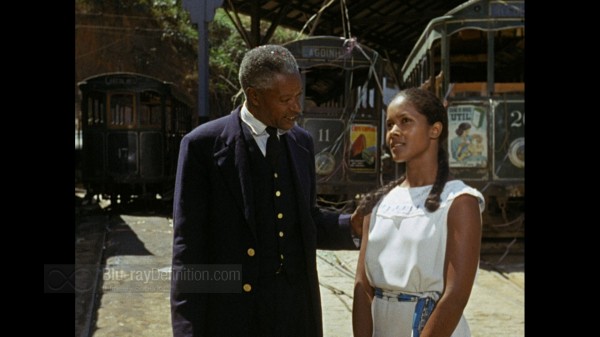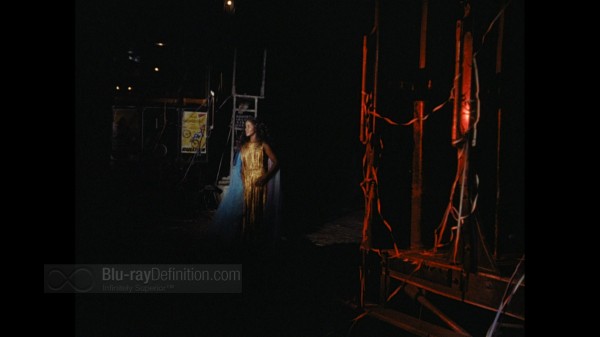- Aspect Ratio: 1.33:1
- Video Codec: AVC/MPEG-4
- Resolution: 1080p/24
- Audio Codec: Portuguese PCM 1.0 (48kHz/24-bit), English PCM 1.0 (48kHz/24-bit)
- Subtitles: English
- Region: A
- Rating: Not Rated
- Discs: 1
- Studio: Criterion
- Blu-ray Release Date: August 17, 2010
- List Price: $39.95
[amazon-product align=”right”]B003N2CVOK[/amazon-product]
Purchase Black Orpheus on Blu-ray at CD Universe
Shop for more Blu-ray titles at Amazon.com
Overall
[Rating:4/5]
The Film
[Rating:4/5]
Video Quality
[Rating:3.5/5]
Audio Quality
[Rating:4/5]
Supplemental Materials
[Rating:3.5/5]
Click thumbnails for high-resolution 1920X1080p screen captures
(Screen captures are lightly compressed with lossy JPEG thus are meant as a general representation of the content and do not fully reveal the capabilities of the Blu-ray format)
The Film
[Rating:4/5]
If you’ve never heard of the French director Marcel Camus before you can be forgiven for Black Orpheus is pretty much his one claim to fame, his “one-hit wonder,” if you will. Exploding in the international film scene in 1959, the film introduced the world to Brazilian culture, particularly black Brazilian culture, and allowed the “art house” filmmakers to expand their repertoire to included films less dour and pensive.
Based on the play by Vinicius De Moraes, Black Orpheus took the myth of Orpheus and Eurydice and placed it amongst the slums of Brazil against the backdrop of Carnaval. It portrayed the nonstop revelry, merrymaking, dancing, and music making of the time surrounding Carnaval.
Is it an authentic vision of the poor and the black in Brazil? Probably not, considering it is a mostly French film co-produced with the Italians and Brazilians. It is a European vision of the poor in South America — downtrodden, but always at the ready to party.
Skewed social presumptions aside, Black Orpheus did employ an all Brazilian cast, except for Marpessa Dawn, the American actress who played Eurydice, and a genuine Brazilian soundtrack responsible for exposing North Americans and Europeans to the world of bossa nova and samba.
Of course, hidden beneath all the bacchanalia of Black Orpheus is the tragedy of the Orpheus story. Like Romeo and Juliet, our two lovers are whisked away by romance against a celebratory backdrop that, forebodingly, can end but only one way.
Video Quality
[Rating:3.5/5]
The new high definition transfer of Black Orpheus was created on a Spirit HD Datacine from a 35mm interpositive. Thousands of instances of dirt, debris, scratches, splices, warps, jitter, and flicker were manually removed using MTT’s DRS system and Pixel Farm’s PFClean system, while Digital Vision’s DVNR system was used for small dirt, grain, and noise reduction.
Coming to Blu-ray from Criterion in its original 1.33:1 aspect ratio in an AVC/MPEG-4 encoding, Black Orpheus maintains a film-like presentation, grain is definitely still present and realistic, but detail is rather soft. There are a few instances of source damage that crop up still, like scratches down the frames, hairs and other debris and some noticeable flicker. Mostly, however, the colors never seem to really “pop” and for a film that so relies on its visual aesthetic, I was very disappointed in the rather dull look of the coloration of this transfer, it really did not look anything special to my eyes.
Audio Quality
[Rating:4/5]
The monaural soundtrack was remastered at 24-bit from a 35mm optical track print. Clicks, thumps, hiss, and hum were manually removed using Pro Tools HD. Crackle was attenuated using AudioCube’s integrated audio workstation.
The original Portuguese language soundtrack in PCM 1.0 (48kHz/24-bit) is included alongside an English dub (48kHz/24-bit). With only one channel to work with, there’s only so much this soundtrack can provide, but it is certainly adequate enough to provide a believably roaring jet airplane engine early on in the film. Some of the more active musical sequences sound a little weak and display some signs of clipping that are probably a due to the technology of the day. Overall, the soundtrack gets the job done.
Supplemental Materials
[Rating:3.5/5]
Criterion doesn’t disappoint with the supplements on Black Orpheus, including some archival interview footage of the director and actress Marpessa Dawn as well as a few HD featurettes exploring the film and its music.
The supplements provided with this release are:
- Marcel Camus (1.33:1; 1080i; 0:03.23) — An interview with filmmaker Marcel Camus recorded during the 1959 Cannes Film festival, where Black Orpheus ultimately won the Palme d’Or. The Interview was conducted by Françcois Chalias for the French television program Reflet de Cannes and originally broadcast on May 10, 1959.
- Marpessa Dawn (1.33:1; 1080i; 0:05.10) — This rare interview with Marpessa Dawn, who plays Eurídice in Black Orpheus, was recorded for the French television program Nord actualités télé and originally broadcast on March 20, 1963.
- Revisiting Black Orpheus (1.78:1; 1080p/24; 0:16.27) — The French-Brazilian-Italian co-production Black Orpheus is often considered less a Brazilian film than one with a decidedly European perspective. Here, Brazilian film scholar Robert Stam discusses this criticism and Black Orpheus’ importance in film history.
- Black Orpheus and that Bossa Nova Sound! (1.78:1; 1080p/24; 0:18.05) — Black Orpheus introduced and international audience to the sights and sounds of Rio de Janeiro. In this featurette, produced by Criterion in 2010, jazz historian Gary Giddins and Brazilian author Ruy Castro recall the roots of the film’s score and the role it played in popularizing the bossa nova sound.
- Looking for “Black Orpheus” (1.78:1; 1080i/60; 1:28.48) — This 2005 feature-length documentary by René Letzgus and Bernard Tournois traces the making of Black Orpheus, its cultural and musical roots, and its resonance in Brazil today. It features interviews with actors Breno Mello and Léa Garcia’ musicians Gilberto Gil, Seu Jorge, Roberto Menescal, and Milton Nascimento; filmmaker Carlos Diegues; film historian Tunico Amacio; and Silvio Autuori, onetime assitant to director Marcel Camus.
- Theatrical Trailer
- Booklet: Featuring an essay by film critic Michael Atkinson
The Definitive Word
Overall:
[Rating:4/5]
Marcel Camus captured the Brazilian sun and the rhythms of Carnaval in this re-imagining of the tragic Greek myth and brought a whole culture to the world with Black Orpheus. Winner of the 1959 Palme d’Or and 1960 Academy Award for Best Foreign Language Feature, it is a colorful and memorable splash of Brazil on celluloid.
Additional Screen Captures:
[amazon-product align=”right”]B003N2CVOK[/amazon-product]
Purchase Black Orpheus on Blu-ray at CD Universe


![Purchase Black Orpheus [Criterion Collection] on Blu-ray at Amazon.com](https://v8i2j3k6.delivery.rocketcdn.me/wordpress/wp-content/uploads/2010/07/blackorpheus-240x338.jpg)


